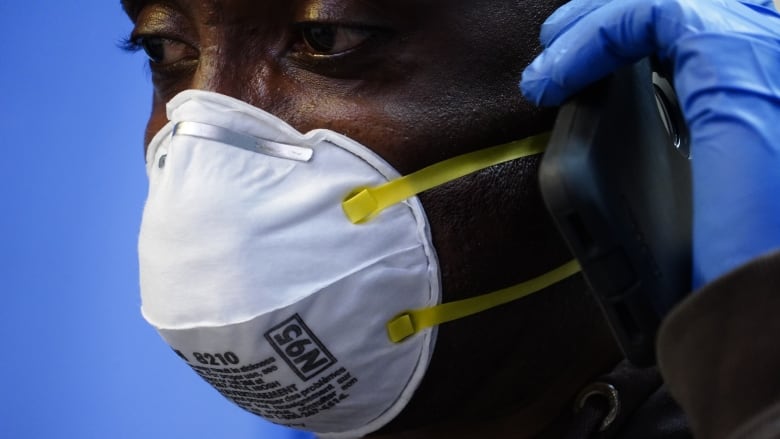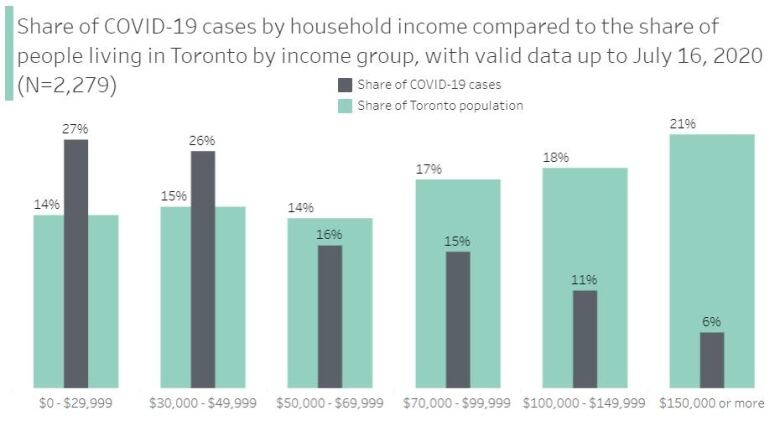Black people and other people of colour make up 83% of reported COVID-19 cases in Toronto
21% of reported cases affect Black people, who make up only 9% of the city's overall population

Black people and other people of colour make up 83 per cent of reported COVID-19 caseswhileonly making up half of Toronto'spopulation, according to the latest data from the city.
Dr. Eileen de Villa, along with Toronto Mayor John Tory, and other officials, presented new findings and data trends on Thursday afternoonthat show racialized and lower income communities in the city aredisproportionately affected by the novel coronavirus.
- To read the complete set of city data, click here.
"Unfortunately, [COVID-19] has had a greater impact on those in our community who face greater health inequities," said de Villa, who is the city's medical officer of health.
De Villa saidthe data shows that Black people account for21 per cent of reported cases in the city, while making up only nineper cent of the overall population.
Similarly, Arab, Middle Eastern and West Asian people represent11 per cent of the city's COVID-19 cases, while only making up 4 per cent of the total population, de Villa said.
The data also shows that East Asian and whitepeople are under represented compared to the sizeof those populations, de Villa said.

People of colour make up 71 per cent of thosehospitalized with COVID-19.
This figure, however, is based on a relatively small number of hospitalizations, de Villa said, adding that there have not been a lot of hospitalizations since the city started collecting socio-demographic data.
Lower income,largerhouseholds alsoaffected
Lower-income households and households with more people were also disproportionately affected by COVID-19, the data shows.
Fifty-oneper cent of reported cases in Toronto were from people living in low-income households, though only30 per cent of the city's population is considered low income.

People living in households of five or more people make up 27 per cent of cases, while making up only 20 per cent of the population.
'COVID-19is notthe great equalizer it discriminates'
Kwame McKenzie, the CEO of the Wellesley Institute and a professor ofpsychiatry at the University of Toronto, says the pandemic has magnified existing issues in marginalized communities.
"Some people thought that COVIDwould be the great equalizer," McKenzie told CBC Toronto.
"COVID-19 is not a great equalizer it discriminates."
WATCH:Kwame McKenzie talks about the pandemic's impact on racialized communities
He says in Toronto, racialized people are more likely to live in poverty andpoor housing, they're more likely to be victims of crime and discrimination, and they're more likely to have precarious work and have problems getting enough nutritious food.
"All of these things lead to worse health and worse social circumstances," he said.
McKenzie, whohas been critical of the federal government for not collecting race-based data during the pandemic, says the findings, though disturbing, don't surprise him.
He saysother countries, like the United Kingdom and the United States, have seen similar figures.
"We sometime think that we're very different here in Canada and that we don't have anti-Black systemic racism," he said. "But the data seems to show that maybe we do."
Limitations of the data
The data was collected from people infected with COVID-19 and who voluntarily answered socio-demographic questions.
The city's health agency says it started collectingcase data on reported ethno-racial identity, household income and household size "to understand if Toronto residents have been inequitably affected by COVID-19."
The city started collecting data on May 20, three months after Torontohad its first COVID-19 case. The findings include data up toJuly 16.
Approximately 27 per cent of people with confirmed or probable cases of COVID-19 reported within that timeframe did not have socio-demographic data collected due to a number of reasons.
The datadoes not include long-term care or retirement home residents or Indigenous people, de Villa said.
The agency is not releasing any data on the pandemic's impact on Indigenous peoplebecause consultations with representatives from the Indigenous community areongoing, de Villa said.
Meeting the need
De Villa said the health agency is working to addressthe needs ofcommunities that are disproportionately affected by COVID-19.
In the short term, de Villa said,that would include things liketargeted testing, enhanced communications and increased access to social supports, likevoluntary isolation sites for people who cannot properly quarantine.
In the long-term, she said, the city needs to look at affordable housing, access to employment and educational opportunities, adding that "we need to address systemic racism."
McKenzie sayshe is happy the city has decided to collect socio-demographic data.
"We've been flying blind," he said. "We just haven't had that data."
Now, he says, health officials need to use the findingsto make future health-care decisions.
"We have to use this terrible circumstance as an opportunity to actually have a new normal," he said.
"And the new normal should be that we do have socio-demographic data and that we do have all of our health responses based on knowledge of what we have to do to make things equitable."
With files from Farrah Merali













_(720p).jpg)


 OFFICIAL HD MUSIC VIDEO.jpg)
.jpg)



























































































